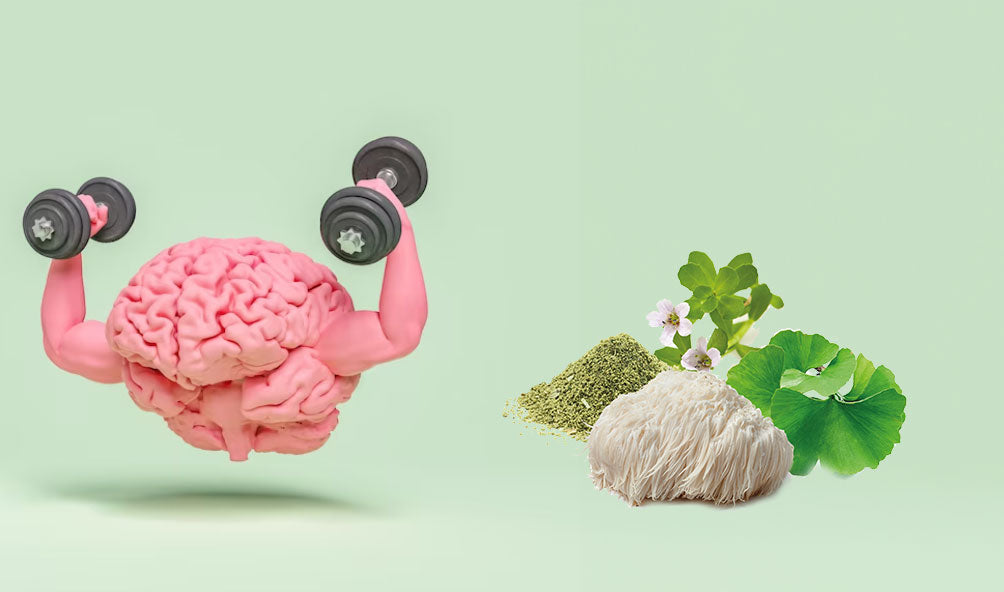Favourite Herbs for Brain Health

Herbs, fungi and medicinal plants have long been used to optimise overall health and wellbeing, and our ancestors used many plants to support brain function. Cognitive health issues can be due to chronic/acute stress, trauma, or ageing, and it is important to look after our brain throughout the life cycle.
Nootropics and Brain Health
Nootropics are brain-boosters that come in many different forms from caffeine to lion’s mane mushroom. Also known as smart drugs, these substances are proven to enhance brain health and cognitive performance.
There are a variety of different substances that can be considered nootropic and the list keeps on growing. What they all have in common is that they boost brain function, producing a range of benefits including supporting memory, focus, mood, and relaxation.
Here are a few of our favourite nootropics and plants that naturally support brain health:
#1 Lions Mane: Our favourite mushroom for brain support. Lion’s mane has a traditional history of use by Buddhist monks to enhance brain power and heighten focus during meditation. It stimulates production of nerve growth factor (NGF) which helps to maintain the neurons, which are the brain cells responsible for helping us to process and transmit information, aiding learning and memory, as well as optimising neurogenesis; the creation and growth of new brain cells (1). Discover our Organic Fermented Lion’s Mane.
#2 Holy Basil: An adaptogenic herb that helps to support cognitive functioning and protects the body from damage induced by stress. It helps to bring mental clarity and studies have found it decreases stress hormone levels which helps to improve cognitive functioning (2). One study found that adults who took holy basil regularly for 15 days experienced a boost in cognitive function compared to participants who were given a placebo (3).
#3 Rhodiola: Rhodiola is one of the most powerful adaptogenic herbs and thrives under harsh conditions. It is revered for its ability to support physical and mental performance particularly when under stress. Rhodiola has an anti-fatigue effect and can help to improve mental processing and brain function (4).
#4 Bacopa: A plant that has been used for centuries in traditional Ayurvedic medicine. It is sometimes called brahmi, and has traditionally been used for various ailments, but is best known as a neural tonic and memory enhancer (1). Studies have shown the benefits of bacopa in improving speed of processing visual information, learning rate, attention, and memory (6, 7).
#5 Green Tea: One of the oldest nootropic herbs, long utilised by Buddhist monks in Asia. Rich in antioxidants and L-Theanine which helps to promote a calm and clear mind. Studies have found that green tea may benefit cognition, mood, and brain function (8, 9, 10).
These are just a few of our favourite herbs, foods and fungi for brain health. It is important to optimise your diet, sleep, and use stress management tools to support brain functioning, and utilise these ancient herbs and foods for extra cognitive support along the way.
Your weapon for optimised focus and clarity
At Living Nutrition we have formulated our kefir-kombucha fermented Natural Nootropic supplement, combining bioactive herbs like gingko, bacopa and green tea, alongside lion’s mane mushroom. It’s designed to enhance mental clarity and performance and naturally support brain health. We also have a full Cognitive range of supplements and Organic Fermented Rhodiola and Holy Basil which support the body’s ability to manage stress and anxiety and aid mental performance.
Find our full range of kefir-kombucha fermented herbal supplements here…
References:
1: https://pubmed.ncbi.nlm.nih.gov/24266378/
2: https://pubmed.ncbi.nlm.nih.gov/22455995/
3: https://pubmed.ncbi.nlm.nih.gov/26571987/
4: https://pubmed.ncbi.nlm.nih.gov/19016404/
5: https://www.ncbi.nlm.nih.gov/pmc/articles/PMC3746283/
6: https://pubmed.ncbi.nlm.nih.gov/11498727/
7: https://pubmed.ncbi.nlm.nih.gov/23320031/
8: https://pubmed.ncbi.nlm.nih.gov/28899506/
9: https://www.frontiersin.org/articles/10.3389/fnagi.2022.919766/full
10: https://www.sciencedirect.com/science/article/abs/pii/S0944711317300867


